

Has dopamine got us hooked on tech? In an unprecedented attack of candour, Sean Parker, the 38-year-old founding president of Facebook, recently admitted that the social network was founded not to unite us, but to distract us.
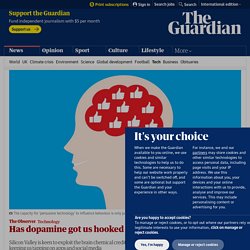
“The thought process was: ‘How do we consume as much of your time and conscious attention as possible?’” He said at an event in Philadelphia in November. To achieve this goal, Facebook’s architects exploited a “vulnerability in human psychology”, explained Parker, who resigned from the company in 2005. Whenever someone likes or comments on a post or photograph, he said, “we… give you a little dopamine hit”. Facebook is an empire of empires, then, built upon a molecule. The positives and negatives of using social networking sites - BBC News School Report.
Image copyright PA Social networking is a topic that divides opinion - some people think it's an amazing tool but others are worried about the impact it has on people's lives.
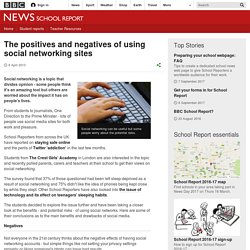
From students to journalists, One Direction to the Prime Minister - lots of people use social media sites for both work and pleasure. School Reporters from across the UK have reported on staying safe online and the perils of Twitter 'addiction' in the last few months. Facebook LIve - New zealand shootings. The dangers of kids using technology. A modern day horror story we like to tell? Facebook accused of striking 'secret deals over user data' Image copyright Getty Images Emails written by Facebook's chief and his deputies show the firm struck secret deals to give some developers special access to user data while refusing others, according to MPs.
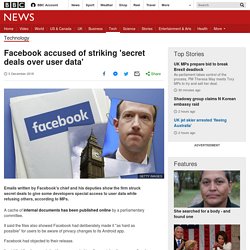
A cache of internal documents has been published online by a parliamentary committee. It said the files also showed Facebook had deliberately made it "as hard as possible" for users to be aware of privacy changes to its Android app. Facebook had objected to their release. It said that the documents had been presented in a "very misleading manner" and required additional context.
The emails were obtained from the chief of Six4Three - a software firm that is suing the tech giant - and were disclosed by the Digital, Culture, Media and Sport Committee as part of its inquiry into fake news. About 250 pages have been published, some of which are marked "highly confidential". Damian Collins MP, the chair of the committee, highlighted several "key issues" in an introductory note.
Schools are increasingly installing CCTV cameras in classrooms. In March this year, Sam Goodman, 18, walked out of his politics lesson to protest against four CCTV cameras that had been installed overnight in the classroom.

Someone to watch over you. When Matthew Gould walks into his office tomorrow morning, his in-tray will look something like this: three British holidaymakers killed in a bus crash in Tasmania, five held on drug charges in the United Arab Emirates, one female traveller still missing in Mexico, one kidnapping, two forced marriages, three abducted children, several rapes, and a family refusing to pay the airfare home for a drug-addicted relative taken ill in the Far East.
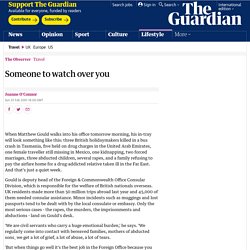
CCTV doesn't keep us safe, yet the cameras are everywhere. Pervasive security cameras don't substantially reduce crime.

There are exceptions, of course, and that's what gets the press. Most famously, CCTV cameras helped catch James Bulger's murderers in 1993. And earlier this year, they helped convict Steve Wright of murdering five women in the Ipswich area. But these are the well-publicised exceptions. Overall, CCTV cameras aren't very effective. This fact has been demonstrated again and again: by a comprehensive study for the Home Office in 2005, by several studies in the US, and again with new data announced last month by New Scotland Yard.
Facebook security breach: Up to 50m accounts attacked. Image copyright Reuters Facebook says almost 50 million of its users were left exposed by a security flaw.
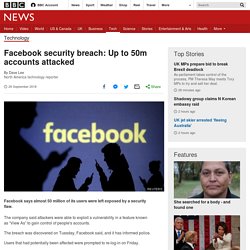
South Korean dies after games session. A South Korean man has died after reportedly playing an online computer game for 50 hours with few breaks.

The 28-year-old man collapsed after playing the game Starcraft at an internet cafe in the city of Taegu, according to South Korean authorities. The man had not slept properly, and had eaten very little during his marathon session, said police. Multi-player gaming in South Korea is extremely popular thanks to its fast and widespread broadband network. Games are televised and professional players are treated, as well as paid, like sports stars. Girl starved to death while parents raised virtual child in online game. South Korean police have arrested a couple for starving their three-month-old daughter to death while they devoted hours to playing a computer game that involved raising a virtual character of a young girl.
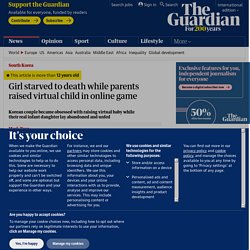
The 41-year-old man and 25-year-old woman, who met through a chat website, reportedly left their infant unattended while they went to internet cafes. This is all the data Facebook and Google have on you. Want to freak yourself out?
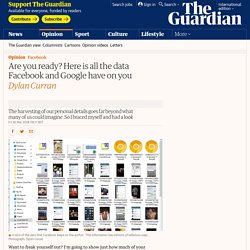
I’m going to show just how much of your information the likes of Facebook and Google store about you without you even realising it. Google knows where you’ve been Google stores your location (if you have location tracking turned on) every time you turn on your phone. Facebook tracks everything you type even if you DON'T post the update or comment.
Facebook tracks everything you type even if you DON'T post the update or comment. Google says hackers steal almost 250,000 web logins each week. Looking at cybercriminal black markets and public forums, the company found millions of usernames and passwords stolen directly through hacking. ‘I’m really sorry that this happened’: Zuckerberg breaks his silence, admits Facebook made mistakes in Cambridge Analytica crisis. LONDON—Breaking five days of silence, Facebook CEO Mark Zuckerberg admitted mistakes and outlined steps to protect user data in light of a privacy scandal involving a data-mining firm connected to President Donald Trump.